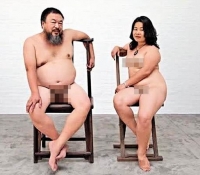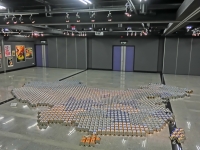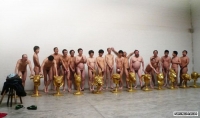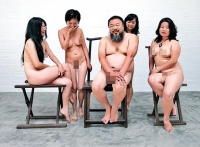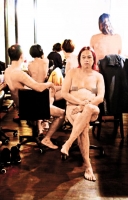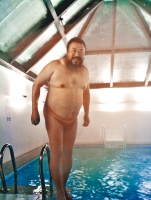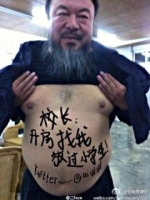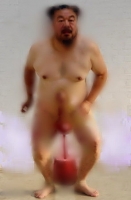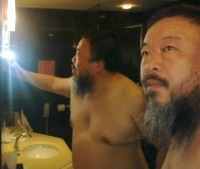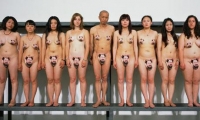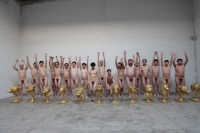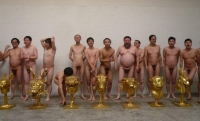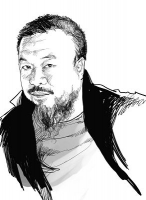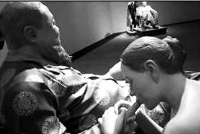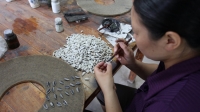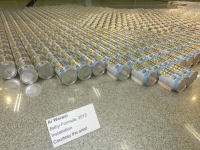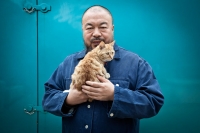| Township: | 北京 | ||
Read works of Ai Weiwei at 百家争鸣 | |||
Life and workAi Weiwei's father was Chinese poet Ai Qing, who was denounced during the Anti-Rightist Movement and in 1958 sent to a labour camp in Xinjiang with his wife, Gao Ying. Ai Weiwei was one year old at the time and lived in Shihezi for 16 years. In 1975 the family returned to Beijing. Ai Weiwei is married to artist Lu Qing.
In 1978, Ai enrolled in the Beijing Film Academy and attended school with Chinese directors Chen Kaige and Zhang Yimou. In 1978, he was one of the founders of the early avant garde art group the "Stars", together with Ma Desheng, Wang Keping, Huang Rui, Li Shuang, Zhong Acheng and Qu Leilei. The group disbanded in 1983, yet Ai participated in regular Stars group shows, The Stars: Ten Years, 1989 (Hanart Gallery, Hong-Hong and Taipei), and a retrospective exhibition in Beijing in 2007:Origin Point (Today Art Museum, Beijing).
From 1981 to 1993, he lived in the United States, mostly in New York, creating conceptual art by altering readymade objects. He studied at Parsons School of Design and at the Art Students League of New York. At the same time, Ai became fascinated by blackjack card games and frequented Atlantic City casinos. He is still regarded in gambling circles as a top tier professional blackjack player according to an article published on blackjackchamp.com.
In 1993, Ai returned to China after his father became ill. He helped establish the experimental artists' Beijing East Village and published a series of three books about this new generation of artists: Black Cover Book (1994), White Cover Book (1995), and Gray Cover Book (1997).
Ai Weiwei's contribution to the Documenta 12 in Kassel 2007Ai Weiwei is its Artistic Director of China Art Archives & Warehouse (CAAW), which he co-founded in 1997. This contemporary art archive and experimental gallery in Beijing concentrated on experimental art from the People's Republic of China, initiates and facilitates exhibitions and other forms of introductions inside and outside China. The building which houses it was designed by Ai in 2000.
In 1998, Ai moved to Caochangdi, in the northeast of Beijing, and built a studio house – his first architectural project. Due to his interest in architecture, he founded the architecture studio FAKE Design, in 2003. In 2000, he co-curated the art exhibition Fuck Off with curator Feng Boyi in Shanghai, China.
In 2006, Ai and HHF Architects designed a private residence in upstate New York for collectors Christopher Tsai and André Stockamp. According to the New York Times, the Tsai Residence is divided into four modules and the details are "extraordinarily refined". In 2009, the Chicago Athenaeum Museum of Architecture and Design selected the home for its International Architecture Awards, one of the world's most prestigious global awards for new architecture, landscape architecture, interiors and urban planning. In 2010, Wallpaper magazine nominated the Tsai Residence for its Wallpaper Design Awards category: Best New Private House. A detached guesthouse to the Tsai Residence, also designed by Ai and HHF Architects, was completed after the main house and, according to New York Magazine, looks like a "floating boomerang of rusty Cor-Ten steel."
Ai Weiwei's Fountain of Light (2007) is a 7m high tower of steel and crystals, reinterpreting Vladimir Tatlin's Monument to the Third International.
On 15 March 2010, Ai took part in Digital Activism in China, a discussion hosted by The Paley Media Center in New York with Jack Dorsey (founder of Twitter) and Richard MacManus.
ExhibitionsAi's artwork has been exhibited in Australia, Europe, North and South America. Solo exhibitions include Stiftung DKM, Duisburg (2010); Museum of Contemporary Craft, Portland (2010); Arcadia University Gallery, Glenside (2010); Mori Art Museum, Tokyo (2009); Haus der Kunst, Munich (2009); Three Shadows Photography Art Center, Beijing (2009); Sherman Contemporary Art Foundation, Cambelltown Arts Center, Sydney (2008); Groninger Museum, Groningen (2008).
Ai’s work was included in the 48th Venice Biennale in Italy (1999), 1st Guangzhou Triennale in China (2002), 1st Montpellier Biennial of Chinese Contemporary Art in France (2005), The 2nd Guangzhou Triennial (2005), Busan Biennial in Korea (2006), The 5th Asia-Pacific Triennial of Contemporary Art in Australia (2006), Documenta 12 in Germany (2007), Liverpool Biennial International 08 in the United Kingdom (2008), 2010 Venice Architecture Biennale and the 29th Sao Paulo Biennial in Brazil (2010).
Sunflower Seeds, 2010Fairytale is the title of Ai's contribution for Documenta 12 in 2007. For this project Ai brought 1001 people from all over China to the city of Kassel in Germany. They were chosen through an open invitation he posted on his blog. Ai even designed clothes, luggage and a temporary home in an old textile factory. He let them wander around the city during the exhibition time of three months. The participants were divided into five groups that each stayed in Kassel for eight days. According to Philip Tinari the primary design object here is not the clothing or suitcases but the participants' experiences, even their spirits. During the exhibition his monumental outdoor sculpture titled Template, made of wooden doors and windows from destroyed Ming and Qing Dynasty houses (1368–1911), collapsed after a storm. In 2008 he curated the architecture project Ordos 100 in Ordos City, Inner Mongolia. He invited 100 architects from all over the world (29 countries) to participate in this project.
Ai curated the exhibition The State of Things, together with Belgian artist Luc Tuymans. It was shown at the Centre for Fine Arts in Brussels from 18 October 2009 to 10 January 2010 and at the National Art Museum in Beijing from 1–30 May 2010. From October 2009 to January 2010 Ai exhibited So Sorry at Haus der Kunst in Munich, Germany. This solo exhibition showed Ai’s largest retrospective to date. The title refers to the thousands of apologies expressed recently by governments, industries, and financial corporations worldwide in an effort to make up for tragedies and wrongdoings – though often withhout shouldering the consequences or the desire to acknowledge let alone repair. Saying sorry – or not saying it – is in the headlines everywhere and thus also in China. For this show Ai created the installation Remembering on Haus der Kunst's façade. It was made out of 9000 children's backpacks. They spell out the sentence 'She lived happily for seven years in this world' in Chinese characters. This is a quote from a mother whose child died in the Sichuan earthquake in 2008. Ai said: "The idea to use backpacks came from my visit to Sichuan after the earthquake in May 2008. During the earthquake many schools collapsed. Thousands of young students lost their lives, and you could see bags and study material everywhere. Then you realize individual life, media, and the lives of the students are serving very different purposes. The lives of the students disappeared within the state propaganda, and very soon everybody will forget everything."
Template (2007) after collapseOn 25 July 2009 Ai opened his solo show According to What? at Tokyo's Mori Art Museum, Japan. This exhibition presented 26 works, most made over the past decade.
In December 2009, Ai had a small exhibition at the Comme des Garcons store in Hong Kong.
In February 2010, Ai Weiwei: Dropping the Urn, the first exhibition by Ai to travel outside New York City in the United States, opened at Arcadia University Art Gallery. The exhibition traveled to the Museum of Contemporary Craft in 2010, and the Knoxville Museum of Art and the Victoria and Albert Museum, London, in 2011. Included in the exhibition were iconic works by Ai including a Chinese figure in a Johnnie Walker liquor bottle (Untitled, 1993) and a Coca-Cola vase (Coca-Cola vase, 1997) from the collection of Christopher Tsai and André Stockamp.
From March to September 2010, Ai exhibited Barely Something, an exhibition curated by Roger M. Buergel, the director of Documenta12, at the Museum DKM in Duisburg, Germany.
In October 2010, Sunflower Seeds was installed at the Tate Modern Turbine Hall, London. The work consists of one hundred million porcelain "seeds," each individually hand-painted in the town of Jingdezhen by 1,600 Chinese artisans, and scattered over a large area of the exhibition hall. The artist was keen for visitors to walk across and roll in the work to experience and contemplate the essence of his comment on mass consumption, Chinese industry, famine and collective work. However, on 16 October, Tate Modern stopped people from walking on the exhibit due to health liability concerns over the porcelain dust. In February 2011, a 220-pound (100 kg) pile from Sunflower Seeds sold for $559,394 (well above its high estimate of $195,000) at Sotheby's in London.
Despite the artist's absence, Circle of Animals/Zodiac Heads opened on 4 May 2011, at the Pulitzer Fountain outside the Plaza Hotel in New York City. The heads were also on display at Somerset House in London from 12 May – 26 June 2011. The heads copy 18th century heads in the gardens of the Old Summer Palace, or Yuanmingyuan, near Beijing. They were ransacked by British and French troops during the Second Opium War of 1860, some of them resurfacing in 2000. A Guggenheim curator read Ai's words, "Without freedom of speech there is no modern world, just a barbaric one."
Ai's work is included in numerous public collections, among others the Los Angeles County Museum of Art, and the Museum of Contemporary Art, San Diego. On 20 April 2011, Ai was appointed Visiting Professor of the Berlin University of the Arts.
For the first time outside of China, his photographs of his time in New York City from 1983 to 1993 are featured in an exhibition presented by Asia Society. The earliest photographs are from 1983, while he was living in the Williamsburg neighborhood of Brooklyn. In 1985, he moved to Manhattan’s Lower East Side, where he lived in two different apartments until he returned to China in 1993 to be with his ailing father. The exhibition includes images of the poets Allen Ginsberg, Gu Cheng, and Bei Dao. The exhibition, showcasing 227 photos, opened on 29 June and lasted until 14 August 2011; It then took place at Martin Gropius Bau in Berlin from 15 October 2011 to 18 March 2012. Another exhibition this year Ai Weiwei: Dropping the Urn at the Victoria and Albert Museum from 15 October 2011 – 18 March 2012 featured a selection of ceramic works including Coca Cola Vase and a pile of sunflower seeds. In his ceramic works Ai angages with issues as the loss of historic material culture due to rapid modernization as well as broader themes including perceptions of value, mass production, globalization and the concepts of 'real' and 'fake'.
Awards and NominationsIn March 2010, Ai received an Honorary Doctorate Degree from the Faculty of Politics and Social Science, University of Ghent, Belgium.
In September 2010 he received Das Glas der Vernunft (The Prism of Reason), Kassel Citizen Award, Kassel, Germany.
Ai was ranked 13th in ArtReview's guide to the 100 most powerful figures in contemporary art: Power 100, 2010. Ai is now on top of ArtReview's guide to the 100 most powerful figures in contemporary art: Power 100, 2011.
In December 2011, he was one of four runners-up in Time's Person of the Year award.
Beijing National Stadium
The Beijing National Stadium at night during the 2008 Summer OlympicsAi was commissioned as the artistic consultant for design, collaborating with the Swiss firm Herzog & de Meuron, for the Beijing National Stadium for the 2008 Summer Olympics, also known as the "Bird's Nest." Although ignored by the Chinese media, he had voiced his anti-Olympics views. He later distanced himself from the project, saying, "I've already forgotten about it. I turn down all the demands to have photographs with it," saying it is part of a "pretend smile" of bad taste. In August 2007 he also accused those choreographing the Olympic opening ceremony, including Steven Spielberg and Zhang Yimou, of failing to live up to their responsibility as artists. Ai said "It's disgusting. I don't like anyone who shamelessly abuses their profession, who makes no moral judgment." In February 2008, Spielberg withdrew from his role as advisor to the 2008 Summer Olympics. When asked why he participated in the designing of the Bird's Nest in the first place, Ai replied "I did it because I love design."
Sichuan earthquake student casualties investigationOn 15 December 2008, Ai supported an investigation, started by another Chinese artist, into student casualties in the 2008 Sichuan earthquake. The investigation aimed to compile a list of students killed in the earthquake by 12 May 2009, the earthquake's first anniversary. As of 14 April 2009, the list had accumulated 5,385 names. Ai published the collected names as well as numerous articles documenting the investigation on his blog which was shut down by Chinese authorities in May 2009. He also posted his list of names of schoolchildren who died on the wall of his office at FAKE Design in Beijing.
Ai suffered headaches and claimed he had difficulty concentrating on his work since returning from Chengdu in August 2009, where he was beaten by the police for trying to testify for Tan Zuoren, a fellow investigator of the shoddy construction and student casualties in the earthquake.
On 14 September 2009, Ai was diagnosed to be suffering internal bleeding in a hospital in Munich, Germany, and the doctor arranged for emergency brain surgery. The cerebral hemorrhage is believed to be linked to the police attack.
According to the Financial Times, in an attempt to force Ai to leave the country, two accounts used by him had been hacked in a sophisticated attack on Google in China dubbed Operation Aurora, their contents read and copied; his bank accounts were investigated by state security agents who claimed he was under investigation for "unspecified suspected crimes".
Shanghai studio controversyIn November 2010, Ai was placed under house arrest by the Chinese police. He said this was to prevent the planned party marking the demolition of his newly built Shanghai studio.
The building was designed and built by Ai upon encouragement and persuasion from a "high official [from Shanghai]" as part of a new cultural area designated by Shanghai Municipal authorities; Ai would have used it as a studio and to teach architecture courses. But now Ai has been accused of erecting the structure without the necessary planning permission and a demolition notice has been ordered, even though, Ai said, officials had been extremely enthusiastic, and the entire application and planning process was "under government supervision". According to Ai, a number of artists were invited to build new studios in this area of Shanghai because officials wanted to create a cultural area.
On 3 November 2010 Ai said the government had informed him two months earlier that the newly completed studio would be knocked down because it was illegal. Ai complained that this was unfair, as he was "the only one singled out to have my studio destroyed." The Guardian reported Ai saying Shanghai municipal authorities were 'frustrated' by documentaries on subjects they considered sensitive: two of the better known ones featured Shanghai resident Feng Zhenghu, who lived in forced exile for three months in Narita Airport, Tokyo; another well known documentary focused on Yang Jia, who murdered six Shanghai police officers.
In the end, the party took place without Weiwei's presence; his supporters feasted on river crab, an allusion to "harmony", and a euphemism used to jeer official censorship. Ai was released from house arrest the next day.
Like other activists and intellectuals, Ai was prevented from leaving China in late 2010. Ai suggested that the authorities wanted to prevent him from attending the ceremony in December 2010 to award the 2010 Nobel Peace Prize to fellow dissident Liu Xiaobo. Ai said that he had not been invited to the ceremony, and was attempting to travel to South Korea for a meeting when he was told that he could not leave for reasons of national security.
In the evening of 11 January 2011, Ai's studio was demolished in a surprise move by the local government.
2011 arrest
South China Morning Post reports that Ai received at least two visits from the police, the last being on 31 March – three days before his detention – apparently with offers of membership to the Chinese People's Political Consultative Conference. A staff member recalled that Ai had mentioned receiving the offer earlier, "[but Ai] didn't say if it was a membership of the CPPCC at the municipal or national level, how he responded or whether he accepted it or not."
On 24 February, amid an online campaign for Middle East-style protests in major Chinese cities by overseas dissidents, Ai posted on his Twitter account: "I didn’t care about jasmine at first, but people who are scared by jasmine sent out information about how harmful jasmine is often, which makes me realize that jasmine is what scares them the most. What a jasmine!"
The caption (草泥马挡中央, "grass mud horse covering the middle") to Ai's self-portrait sounds almost the same in Chinese as 肏你妈党中央, "Fuck your mother, the Communist party central committee".On 3 April, Ai was arrested at Beijing Airport just before catching a flight to Hong Kong and his studio facilities were searched. A police contingent of approximately 50 officers came to his studio, threw a cordon around it and searched the premises. They took away laptops and the hard drive from the main computer; along with Ai, police also detained eight staff members and Ai's wife, Lu Qing. Police also visited the mother of Ai's two year-old son. While state media originally reported on 6 April that Ai was arrested at the airport because "his departure procedures were incomplete," the Chinese Ministry of Foreign Affairs said on 7 April that Ai was arrested under investigation for alleged economic crimes. Then, on 8 April, police returned to Ai's workshop to examine his financial affairs. On 9 April, Ai's accountant, as well as studio partner Liu Zhenggang and driver Zhang Jingsong, disappeared, while Ai's assistant Wen Tao has remained missing since Ai's arrest on 3 April. Ai's wife said that she was summoned by the Beijing Chaoyang district tax bureau, where she was interrogated about his studio's tax on 12 April.
Response to Ai's arrestSee also: Free Ai Weiwei street art campaign
Analysts and other activists said Ai had been widely thought to be untouchable, but Nicholas Bequelin from Human Rights Watch suggested that his arrest, calculated to send the message that no one would be immune, must have had the approval of someone in the top leadership. International governments, human rights groups and art institutions, among others, have called for Ai's release, while Chinese officials have yet to notify Ai's family of his whereabouts.
State media started describing Wei as a 'deviant and a plagiarist' in early 2011. The China Daily subsidiary, the Global Times editorial on 6 April 2011 attacked Wei, saying "Ai Weiwei likes to do something 'others dare not do.' He has been close to the red line of Chinese law. Objectively speaking, Chinese society does not have much experience in dealing with such persons. However, as long as Ai Weiwei continuously marches forward, he will inevitably touch the red line one day." Two days later, the journal scorned Western media for questioning Ai's charge as a "catch-all crime", and denounced the use of his political activism as a "legal shield" against everyday crimes. It said "Ai's detention is one of the many judicial cases handled in China every day. It is pure fantasy to conclude that Ai's case will be handled specially and unfairly." Frank Ching expressed in the South China Morning Post that how the Global Times could radically shift its position from one day to the next was reminiscent of Alice in Wonderland.
Tate Modern in London, home to Ai's 'Sunflower Seeds' exhibition, put a large sign on their exterior that reads "Release Ai Weiwei"Michael Sheridan of The Times suggested that Ai had offered himself to the authorities on a platter with some of his provocative art, particularly photographs of himself nude with only a toy alpaca hiding his modesty – with a caption『草泥马挡中央』 ("grass mud horse covering the middle"). The term possesses a double meaning in Chinese: one possible interpretation was given by Sheridan as: "Fuck your mother, the party central committee".
Ming Pao in Hong Kong reacted strongly to the state media's character attack on Ai, saying that authorities had employed “a chain of actions outside the law, doing further damage to an already weak system of laws, and to the overall image of the country.” Pro-Beijing newspaper in Hong Kong, Wen Wei Po, announced that Ai was under arrest for tax evasion, bigamy and spreading indecent images on the internet, and vilified him with multiple instances of strong rhetoric. Supporters said "the article should be seen as a mainland media commentary attacking Ai, rather than as an accurate account of the investigation."
The United States and European Union protested Ai's detention. The international arts community also mobilised petitions calling for the release of Ai: "1001 Chairs for Ai Weiwei" was organized by Creative Time of New York that calls for artists to bring chairs to Chinese embassies and consulates around the world on 17 April 2011, at 1 pm local time "to sit peacefully in support of the artist's immediate release." Artists in Hong Kong, Germany and Taiwan demonstrated and called for Ai to be released.
One of the major protests by U.S. museums took place on 19 and 20 May when the Museum of Contemporary Art San Diego organized a 24-hour silent protest in which volunteer participants, including community members, media, and museum staff, occupied two traditionally styled Chinese chairs for one-hour periods. The 24-hour sit-in referenced Ai’s sculpture series, Marble Chair, two of which were on view and were subsequently acquired for the Museum’s permanent collection.
The Solomon R. Guggenheim Foundation and the International Council of Museums, which organised petitions, said they had collected more than 90,000 signatures calling for the release of Ai. On 13 April 2011, a group of European intellectuals led by Václav Havel had issued an open letter to Wen Jiabao, condemning the arrest and demanding the immediate release of Ai. The signatories include Ivan Klíma, Jiří Gruša, Jáchym Topol, Elfriede Jelinek, Adam Michnik, Adam Zagajewski, Helmuth Frauendorfer; Bei Ling (Chinese:贝岭), a Chinese poet in exile drafted and also signed the open letter.
On 16 May 2011, the Chinese authorities allowed his wife to visit him briefly. Liu Xiaoyuan, his attorney and personal friend, reported that Wei was in good physical condition and receiving treatment for his chronic diabetes and hypertension; he was not in a prison or hospital but under some form of house arrest.
He is the subject of the 2012 documentary film Ai Weiwei: Never Sorry, directed by American filmmaker Alison Klayman, which received a special jury prize at the 2012 Sundance Film Festival and will open the Hot Docs Canadian International Documentary Festival, North America’s largest documentary festival, in Toronto on April 26, 2012.
ReleaseOn 22 June 2011, the Chinese authorities released Ai on bail after close to three months' detention on charges of tax evasion. Beijing Fake Cultural Development Ltd., a company Ai controlled, had allegedly evaded taxes and intentionally destroyed accounting documents. State media also reports that Ai was granted bail takes on account of Ai's "good attitude in confessing his crimes", willingness to pay back taxes, and his chronic illnesses. According to the Chinese Foreign Ministry, he is prohibited from leaving Beijing without permission for one year.
Ai's supporters widely viewed his detention as retaliation for his vocal criticism of the government. On 23 June 2011, professor Wang Yujin of China University of Political Science and Law stated that the release of Ai on bail shows that the Chinese government could not find any solid evidence of Ai's alleged "economic crime".
On 24 June 2011, Ai told a Radio Free Asia reporter that he was thankful for the support of the Hong Kong public, and praised Hong Kong's conscious society. Ai also mentioned that his detention by the Chinese regime was hellish (Chinese: 九死一生), and stressed that he is forbidden to say too much to reporters.
After his release, his sister gave some details about his detention condition to the press, explaining that he was subjected to a kind of psychological torture: he was detained in a tiny room with constant light, and two guards were set very close to him at all times, and watched him constantly.
In November, Chinese authorities were again investigating Ai and his associates, this time under the charge of spreading pornography. Lu was subsequently questioned by police, and released after several hours though the exact charges remain unclear.
Unpaid taxes and finesIn June 2011, the Beijing Local Taxation Bureau demanded a total of over 12 million yuan (US $1.85 million) from Beijing Fake Cultural Development Ltd in unpaid taxes and fines, and accorded three days to appeal the demand in writing. According to Ai's wife, Beijing Fake Cultural Development Ltd has hired two Beijing lawyers as defense attorneys. Ai's family state that Ai is neither the chief executive nor the legal representative of the design company, which is registered in his wife’s name." Lawyer-friend Liu Xiaoyuan has initiated an internet donation (or 'loan') campaign to help Ai to pay the unpaid taxes. They have reportedly received 1 million yuan.
Lawyers acting for Ai submitted an appeal against the fine in January 2012; the Chinese government subsequently agreed to conduct a review.
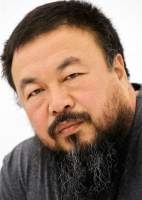
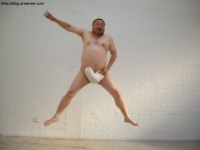
![回顧] 艾未未最近作品 [回顧] 艾未未最近作品
Click to view picture details](http://oson.ca/upload/images11/cache/c9cb0022ed0fc24534cb8c7b2ebafba0.jpg)

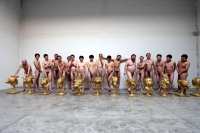
![藝術看客]藝術是個意外評艾未未的
Click to view picture details](http://oson.ca/upload/images11/cache/bf8b3cec1ab38acd768f6d589291df5e.jpg)
